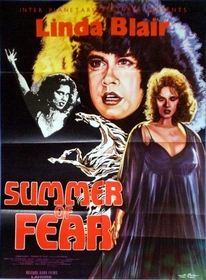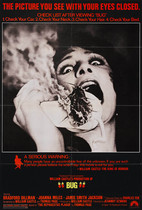Our editor-in-chief Nate Yapp is proud to have contributed to the new book Hidden Horror: A Celebration of 101 Underrated and Overlooked Fright Flicks, edited by Aaron Christensen. Another contributors include Anthony Timpone, B.J. Colangelo, Dave Alexander, Classic-Horror.com's own Robert C. Ring and John W. Bowen. Pick up a copy today from Amazon.com!
Summer of Fear (1978)
As I watched Wes Craven's television movie Summer of Fear, I couldn't help but think of cabbages. Yes, cabbages. Those noble, leafy denizens of the garden, those stoic vegetables whose nutritional value is so often overlooked. In particular, as the scenes from Craven's film flashed across the television and the dialogue assaulted my ears, I couldn't help but think how cabbage might have done a better job making this movie.
Rachel Bryant (Linda Blair) is your typical, everyday upper-class teenager. She rides horses; she has a crush on a boy; she even has an annoying younger brother. And then, predictably, everything changed. Her aunt and uncle, along with their housekeeper, die in a car crash near their home in the Ozarks. Rachel's parents fly out for the funeral, and bring back Julia (Lee Purcell), Rachel's newly orphaned cousin. In another burst of predictability, Julia is not what she seems, and the household appears to be enchanted by the new addition as Julia slowly and methodically starts to replace Rachel, stealing one part of her life at a time.
Summer of Fear is actually a fairly faithful adaptation of Lois Duncan's novel of the same name. While, in most cases, this faithfulness would be considered a positive attribute, Duncan's novel was written for young adults. I can remember being enthralled with her suspenseful stories and her witty dialogue... when I was 12. Unfortunately, if the added sexuality is any indication, the intended audience of Summer of Fear is a fair bit older than the prepubescent girls reading Duncan's novels. Adults, unfortunately, are usually a little quicker on their feet, and much of the “intrigue” is familiar and cliché to an older audience. Also, most of the dialogue in the film is pulled verbatim from the book, and, like the story, this isn't a plus; what 12-year olds think is dramatic and clever often isn't. Words and dialogue in a book often read better in text than they sound spoken out loud. It's the same reason why things always sound better in your head than coming out your mouth. Unfortunately, the writers appear to never have learned this. (Cabbages, I will note, say very little. A wise lesson indeed.)
Further, while Summer of Fear fails to adapt and diverge from the novel when necessary for an effective film, it does change the plot when it is least appropriate to do so. One of the most charming part of Duncan's novel is that is was very ambiguous about its supernatural elements. There are no such ambiguities in Craven's film. The supernatural is front and center, in all of its absurd glory. However, rather than being suspenseful and terrifying, the supernatural in Summer of Fear is just silly. Red specialty contacts are never scary. Ever. Lois Duncan knew the value of a few unanswered questions; sadly, screenwriters Glenn M. Benest and Max A. Keller do not.
Unfortunately for Summer of Fear, the acting does not buoy the inept writing choices. In particular, Linda Blair gives what has to be one of the most ear-rending performances of her career. Blair's character, Rachel, is a spoiled teenage girl, and in this respect, she nails the part. The problem is, however, is that Blair never expands her characterization of Rachel to encompass anything but the spoiled teenage girl. Rachel has no depth, no hidden substance – she is, simply put, a shallow, uninteresting brat. Blair never shifts from the shrill monotone in which she delivers her lines, and, unfortunately, when you act like everything is the end of the world, nothing ever is. Blair's single-minded portrayal of the protagonist is poison to the film. We have a heroine that we don't really care about because, every time she appears on film, she's outright annoying. Every word she utters is grating and suffused with enough emo to kill an indie rocker. (I will take a moment to note that cabbages are unobtrusive and without emo. Good for cabbages.)
Failing a protagonist for which to cheer, audiences should at least be able to hope for a strong villain. Unfortunately, Lee Purcell seems to be taking her cues from Blair. Rather than acting with subtlety and trying to bring an air of mystique and intrigue to the character of Julia, Purcell succumbs to the stereotype. Everything Julia does is oh-so-evil. Her glances are evil, her tones are evil, even her smiles are sickeningly evil. Unfortunately, overt, overwhelming evil is, well, boring.
Finally, we come to the biggest disappointment of the film – director Wes Craven. Craven has built a name for himself as a master of thrills and suspense, an ingenious director that can take a somewhat dubious film and, at the very least, leave you feeling like perhaps you hadn't wasted all of that hour and half. Summer of Fear, however, is one of those times when even the master fails. Craven's direction is unoriginal and uninspired. The shots are flat, showing what needs to be shown and little more. This is one of those few times where I can't help but wonder if the term “negative atmosphere” is valid. While the mood should have reflected the threat of Julia's infiltration, everything is brightly lit, swathed in yellows and golds. The entire screen reeks of middle-class cheerfulness. This may have been intentional, an attempt to make Julia's infiltration seem less sinister, but it just makes her villainy seem so trivial. Instead of terror and suspense, the character is effectively stripped of her menace, making Julia seem more like a minor annoyance than an actual threat. The only thing Craven actually seem to shoot well in the film is Linda Blair's luscious ass, and, given that Blair's character is supposed to be a teenage girl, the effect is slightly pervy. (Cabbages, incidentally, rarely have sexual thoughts about underage girls.) The whole film just leaves you wondering where the hell Craven was when it was being shot.
While the discussion of Summer of Fear may seem unnecessarily laden with leafy greens, there just really isn't much else to say about the film. Summer of Fear is a disappointment on all counts, one of those movies that leave me wishing that I had that hour and half of my life back. Next time when I'm looking for made-for-TV novel adaptations, I may search out films with cabbages in the credits. I may have better luck.
This review is part of Wes Craven Week, the second of four celebrations of master horror directors done for our Shocktober 2007 event.








